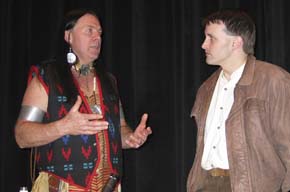Panel forum addresses ‘Faith in the Face of Disaster’
- February 7, 2005
- |
- Will York, Asst. News Editor
- Section: News
Representatives from faiths ranging from Baptist to Lakota Indian gathered for a panel discussion of religious faith’s role in natural and human affairs last Thursday in the Watkins Auditorium. “Faith in the Face of Disaster” was sponsored by the Sigma Phi Epsilon fraternity and the Office of Multicultural Affairs.
The concept of the event was initiated by the December tsunami in Southeast Asia that killed more than 250,000 people.
Luther Mercer, director of the Office of Multicultural Affairs, moderated the event. Panelists discussed how their faiths deal with tragedy. Panelists included Dr. Tahira Arshed, a Muslim; Richard Saunders, a member of the Church of Jesus Christ of Latter-day Saints; Michael Riley, a Buddhist; Brendan Sweetman, a member of the Maori tribe of New Zealand; J.J. Kent, a Lakota Indian and Jane Ogg, a Baptist representing the evangelical Christian faiths.
Mercer opened the discussion by asking panelists why a loving creator would allow disaster to happen. Arshed, who is also a UTM physics instructor, said that the tsunami disaster is a natural phenomenon, a result of the system God set up, not a result of God’s anger. “The world works in natural laws,” Arshed said. “But that does not prevent us from helping others. (Disasters) are considered a trial or test.”
Panelists also discussed whether disasters are foretelling the end of the world and if war is ever necessary.
When asked who is to blame for disaster, Michael Riley responded, “Man is not the enemy. Fear, hatred, anger: These are the enemy. If we know how to embrace our fear, anger and hatred and convert it into compassion and loving kindness, then we can better embrace our neighbor.”
Most of the panel agreed that war is only justifiable when a country is attacked. Jane Ogg, however, said, “Any time you’re supporting God values against non-God values, sometimes you have to defend that with violence.”
The panel also discussed the role of politics in religion and fielded questions from the audience.
At the conclusion of the ninety-minute panel, the panelists were asked if their respective religions were all the same. Most panelists agreed that their religions seek to reveal the same truths, although the methods of attaining that truth differ. Panelist Michael Riley gave a metaphor for his answer. “The raft is not the shore. Once you get to the shore, you leave the raft behind,” he said.
After the event, J.J. Kent played a Nati ve American flute for those who wished to hear.
Sigma Phi Epsilon Vice President of Member Development Kevin Teets said he and Multicultural Affairs director Luther Mercer were “very pleased” with the forum. “There were many more people who attended than we expected, and all those who attended were educated and informed about the faiths represented in society,” Teets said.
